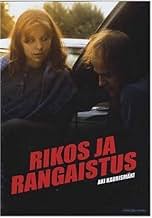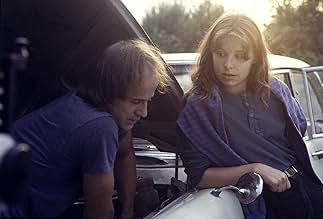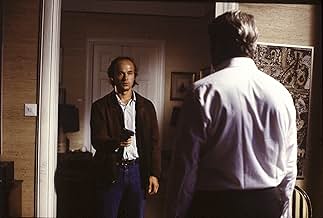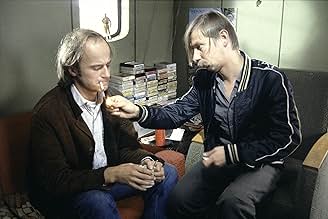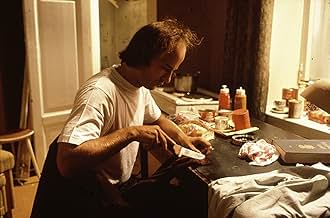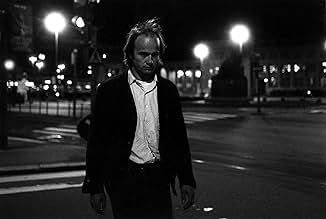Adaptación de la novela de Dostoievski, ambientada en la Helsinki actual. Rahikainen, trabajador de un matadero, asesina a un hombre y se ve obligado a vivir con las consecuencias de sus act... Leer todoAdaptación de la novela de Dostoievski, ambientada en la Helsinki actual. Rahikainen, trabajador de un matadero, asesina a un hombre y se ve obligado a vivir con las consecuencias de sus actos.Adaptación de la novela de Dostoievski, ambientada en la Helsinki actual. Rahikainen, trabajador de un matadero, asesina a un hombre y se ve obligado a vivir con las consecuencias de sus actos.
- Dirección
- Guionistas
- Elenco
- Premios
- 2 premios ganados y 1 nominación en total
- Pianist
- (as Pedro's Heavy Gentleman)
- Drummer
- (as Pedro's Heavy Gentleman)
- Opera Singer
- (sin créditos)
- Man at the Police Station
- (sin créditos)
- Opera Singer
- (sin créditos)
- Dirección
- Guionistas
- Todo el elenco y el equipo
- Producción, taquilla y más en IMDbPro
Opiniones destacadas
I find Kaurismaki's very basic approach to film-making to be refreshing compared to the cynic, gimmicky cinema of our days that is more content to wink at the audience than take the material it presents seriously. The dialogue is as sparse as the plot is thinly stretched and everything in 'Crime and Punishment' has a very minimalist feel to it. It's rather short, clocking at almost 90 minutes, but after Kaurismaki gets done with the setup and motive and general background of the killer, and this happens around the half mark, he just doesn't have a whole lot of places to go with the rest of the film.
As a debut and an exercise in film-making for the young director it's impressive, but it's also monotonous and very one-note and just not very interesting.
The novel is a classic of universal literature, which inspired philosophical, sociological and psychological thoughts in the second half of the 19th century and also in the 20th century, namely Nietzsche, Sartre, Freud, Orwell, Huxley, among others. It's no surprise that it had more than thirty film adaptations, between 1909 and 2019.
This 1983 Finnish adaptation is practically Aki Kaurismäki's directorial debut (before this film he had only directed a musical documentary, in 1981, together with his brother Mika Kaurismäki, who here takes on the role of producer).
It is a promising film, although it neither captures the depth of the novel (none of the adaptations do, obviously) nor shows, still fully developed, the Kaurismäki style, of which it already gives good indications, but only appears mature in the following film, Calamari Union. However, both have in common a taste for minimalist absurdity, which would become the Finnish director's trademark.
An interesting work, mainly because it is the debut of an important director, but it ends up being too conventional, within the Finnish master's work as a whole.
Still, it certainly deserves to be seen.
As with many bad adaptations, it's chiefly concerned with story, and Kaurismäki and his co-screenwriter actually do a rather good job at condensing a vast novel into about an hour-and-a-half runtime. The characters are reduced to four main ones, with the Sonya type taking on qualities of one of the murder victims in the source, as well as of Raskolnikov's sister. The Svidrigaïlov type likewise assumes the part of another of Dostoevsky's characters to accuse Raskolnikov or murder. Similar to the 1935 American version, this character is also shoehorned into the traditional function of a heavy instead of the rather amusing rapscallion he was in prose. Meanwhile, the Sonya isn't a religious hooker with a heart of gold, and Raskolnikov isn't a writer whose murder is an expression of his philosiphizing.
I'm especially displeased that the film does away with this self-referential device of a surrogate author within the story (see Robert Bresson's "Pickpocket" (1959) for how this framework can be quite fruitful). Moreover, Kaurismäki fails to replace the religious and philosophical dialogues of Dostoevsky's work absent here with anything interesting. He begins with his Raskolnikov working in a meat-packing plant, but does nothing to suggest any link between the cutting of flesh and his subsequent murder of a man. In fact, the film changes the murder from being done with an axe in the novel to, here, performed with a gun. I mean, talk about blowing a perfectly good opportunity for a visual motif of cutting bodies apart! This is what I mean by "amateurish." Simple opportunities are wasted, and nothing compelling is put in their place.
The relatively-deadpan acting, or otherwise apparent lack of emotional conveyance, is another odd choice here for being based on an intense book for which the god-like, omnipresent narration looked into the thoughts of its characters. Here, we can't even read the actors' faces and body language because they're so expressionless. The protagonist, at least, conveys an occasional wry sense of humor. This is a rare version that actually shows the Raskolnikov with a slight smile in his climactic look with the Sonya as he discovers she's followed him. But, for the most part, his behavior merely seems erratic. The actress playing the Sonya is worse--I think it's just a bad performance. The police inspector here is another character who could be jovial and witty in prose, but is purely a bore on screen. Again, Bresson worked better with affectless amateur actors in "Pickpocket," and he employed voiceover narration in addition to the surrogate author device to get inside the mind of the protagonist. The 1923 silent German version also reflected Raskolnikov's inner torment well by representing it in the Expressionist set design.
Some of the scenes that Kaurismäki decided to linger on are equally perplexing. Besides the butchering episode, for example, I fail to see the interest of watching the sexist Inspector inform his wife when she's allowed to go to bed, nor why the film spends time watching him drink alcohol. Indeed, there are a few pointless scenes in this one of characters drinking. Although not as bad as another adaptation, "Norte: the End of History" (2013), in this respect and others, it's still flummoxing. When Dostoevsky's characters drank, there were reasons, and they tended to go on at length as to what they were. Too much time is spent on the filmmakers' apparent interest in English-language mood music, as well. Moreover, it's hard to discern what the point of this adaptation was at all. If it were to inhabit Helsinki, then show the city. This is based on a book where the main character repetitively wandered the streets of Saint Petersburg until it becomes almost familiar to even a reader who's never been (and certainly never in Dostoevsky's time). We don't get that here; another opportunity squandered as the film's protagonist talks more about lonely walks than we actually see him doing it. We inhabit, however, parts of Bresson's Paris, or, heck, even that of the entirely artificial settings of the 1923 picture. As much as I dislike "Norte," it does, at least, explore its Filipino locales better than this Finnish counterpart. And, to conclude, this Raskolnikov claims that he's always been alone; yet, we hardly ever see him alone in this picture. Even the one time he drives off by his lonesome, he immediately turns back around. From the first to last scene, he's usually surrounded by people, and he forms intimate relationships with at least two of them. Without demonstrating the statement, to leave it by itself is trite.
This is a blunder of a first film. There's no apparent understanding of the source text, nor a coherent vision of what to make of it. It's not an impossible novel to adapt. Bresson arguably made a masterpiece out of it, Robert Wiene did well in the silent era, the 1935 French version at least rendered the story and acting well--heck, Woody Allen has attacked it thrice now. But, that this Finnish one isn't even the worst tells you that others (and by rather well-respected filmmakers, to boot, including twice-Oscar-nominated Josef von Sternberg (1935), "Russian Ark" (2002) director Aleksandr Sokurov (1994) and slow-cinema arthouse filmmaker Lav Diaz (2013)) have failed, too.
The plot had even some surprising twists, and the ending is done so, that it made me wonder that maybe Kaurismäki has some personal experiences of such feels of guilt and isolation as the main male character. This film, even if it's done nearly 20 years ago, is more than fit to make us think about our current world, and the direction we are heading.
¿Sabías que…?
- TriviaAki Kaurismäki's narrative directorial debut. He chose this project after reading François Truffaut's interview with Alfred Hitchcock, where Hitchcock claimed Crime and Punishment was the one book he would never adapt, because "it would be too difficult." Kaurismäki later admitted it was too difficult.
- Citas
Antti Rahikainen: [to Eeva Laakso] I'll tell you something. The man I killed is not important. I killed a louse, and became one myself. The number of lice remained constant. Unless I was one from the very beginning - but that's not important. I wanted to kill a principle, not a man.
- ConexionesFeatured in Selección TCM: Aki Kaurismaki (2012)
- Bandas sonorasCadillac
Written by Kim Brown, Denys Gibson, Ian Mallet, Stuart Graham Johnson and Vince Taylor
Performed by The Renegades
Selecciones populares
- How long is Crime and Punishment?Con tecnología de Alexa
Detalles
Taquilla
- Presupuesto
- FIM 1,726,378 (estimado)
Contribuir a esta página


